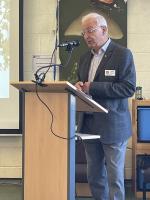Lincolnshire Young Environmentalist Finals - 2025
The 2025 Young Environmentalist Final took place at Whisby Nature Park on 21st May. The individual entry was won by Brody Carter from Healing. The group prize was won by Potterhandworth C of E Primary School;

Finals of the 2025 Lincolnshire Young Environmentalist Award
Lindum Rotary Club in partnership with Lincolnshire Wildlife Trust once again organised this event sponsored by FCC waste disposal services.
This year two awards were presented, one for individual entries and one for groups.
The individual event was closely fought battle and Brody Carter just pipped Paige Bavin to win the trophy. Brody continues to support his village community in Healing, Grimsby. Paige is working hard to in save Rhinos in Africa and has raise £3,000 to train dogs to search for traps and poachers
The schools award was equally close with Potterhanworth C of E Primary School beating Manor Leas Primary School after the judges deliberations. Special mention should also be made of 5 year old Teddie who has set up a litter picking group at St Peter in Eastgate Infants School. Teddie had the public speaking skills of a mature adult, so BBC keep a note of this name for an announcer's post in the future.
The Lindum Lincoln Rotary Club look forward to organising the Awards again next year

Chris Milnes - Chairman of the Lincolnshire Young Enviromentalist Award

Paige Bevin from Bardney

Winner of the individual entry - Brody Carter from Healing

Manor Leas Junior Shool

Ted - Representing St Peter in Eastgate C of E Primary School

Winner of the Group Catergory - Potterhandworth C of E Primary School. Also shown in the picture is Sally Hood from our sponsors FCC and President Rob Wilkinson from Lindum Lincoln Rotary Club
'What We Do' Main Pages:

The 2025 Young Environmentalist Final took place at Whisby Nature Park on 21st May. The individual entry was won by Brody Carter from Healing. The group prize was won by Potterhandworth C of E Primary School;
more
The final of the Lincolnshire Community Environmental Award took place at Whisby Nature Reserve on Saturday September 27th.
more
The Handover from the 'Four Season's President's to President Simon Kalson took place once again with the generous offer at the home of Paul & Gill Smith.
more
This year we have not one but four President's - Starting with Summer - Paul Smith, followed by Autumn - Bob Fletcher, then Winter - Tony Breeson and finally, Spring Rob Wilkinson - i.e. 'The Four Seasons'
more_1.jpg)
Lindum RC & Grantham Kesteven RC are supporting the Rotary Club of Meru who are running a feeding programme for the children living on the streets of Meru. These are some of their stories - with thanks to Joy Mwenda of the Rotaract Club of Mt. Kenya
more
We have received this update from Peter Gitonga in Kenya on the Kalithera workshop supported by our friends at Meru Rotary Club
more


.png)
